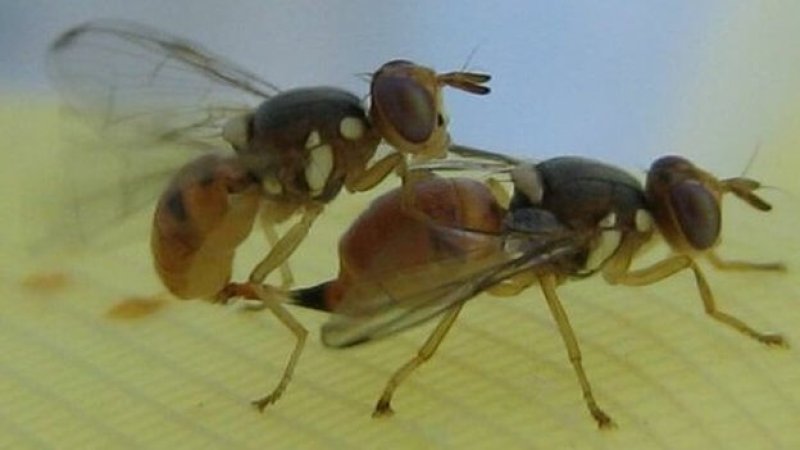If a field test is approved by Spanish authorities, a genetically modified olive fly will be the first GM insect to be released in Europe.
The GM flies are modified to pass on a gene that kills developing larvae. The gene is carried only by male flies and is specifically designed to kill only female flies. The male flies are bred in a laboratory, where they are kept alive with a “dietary supplement that acts as an antidote to this killer gene.” Once released into a native population, any resulting female offspring will die, leaving only males. The flies were developed by Oxitec, a British biotech company, to reduce numbers of the native olive fly, which is European olive farmers’ only major pest.
This isn’t the only insect that has been genetically engineered to kill native populations: GM mosquitoes have been developed to fight such diseases as dengue fever and malaria. The GM mosquito created to fight dengue fever, which was also developed by Oxitec, uses similar larvae-killing technology. When scientists tested the GM mosquito in a Brazilian town, they observed a 96 percent drop in the local mosquito population.
Scientists at the University of California, Irvine, developed a GM mosquito that could reduce rates of malaria. The scientists studied the way that mouse immune systems kill malarial parasites with antibodies, then “created new genes that could mimic that effect in mosquitoes.” Scientists at Johns Hopkins Malaria Research Institute tweaked a mosquito’s genome so that it produced increased amounts of an immune system protein that attacks malarial parasites.
Scientists are facing opposition from groups opposed to genetic engineering, claiming there are safety concerns, although none has been documented. Despite their success in Brazil, scientists haven’t been able to release their GM mosquito in the Florida Keys–where rates of dengue fever have recently risen–due to activist pressure and concerns.
The scientists who created the GM olive fly are facing similar opposition in the EU. Genewatch, an organization that monitors the use of biotechnology, released a statement claiming that the GM flies raise risk of “harmful traits” like pesticide resistance.
Scientists developing GM insects say that years of testing have shown no evidence of adverse effects and insist that these insects could bring great benefits to environmental and human health.
Read the full, original story here: Decision awaited on genetically modified insect trial
Additional Resources:































